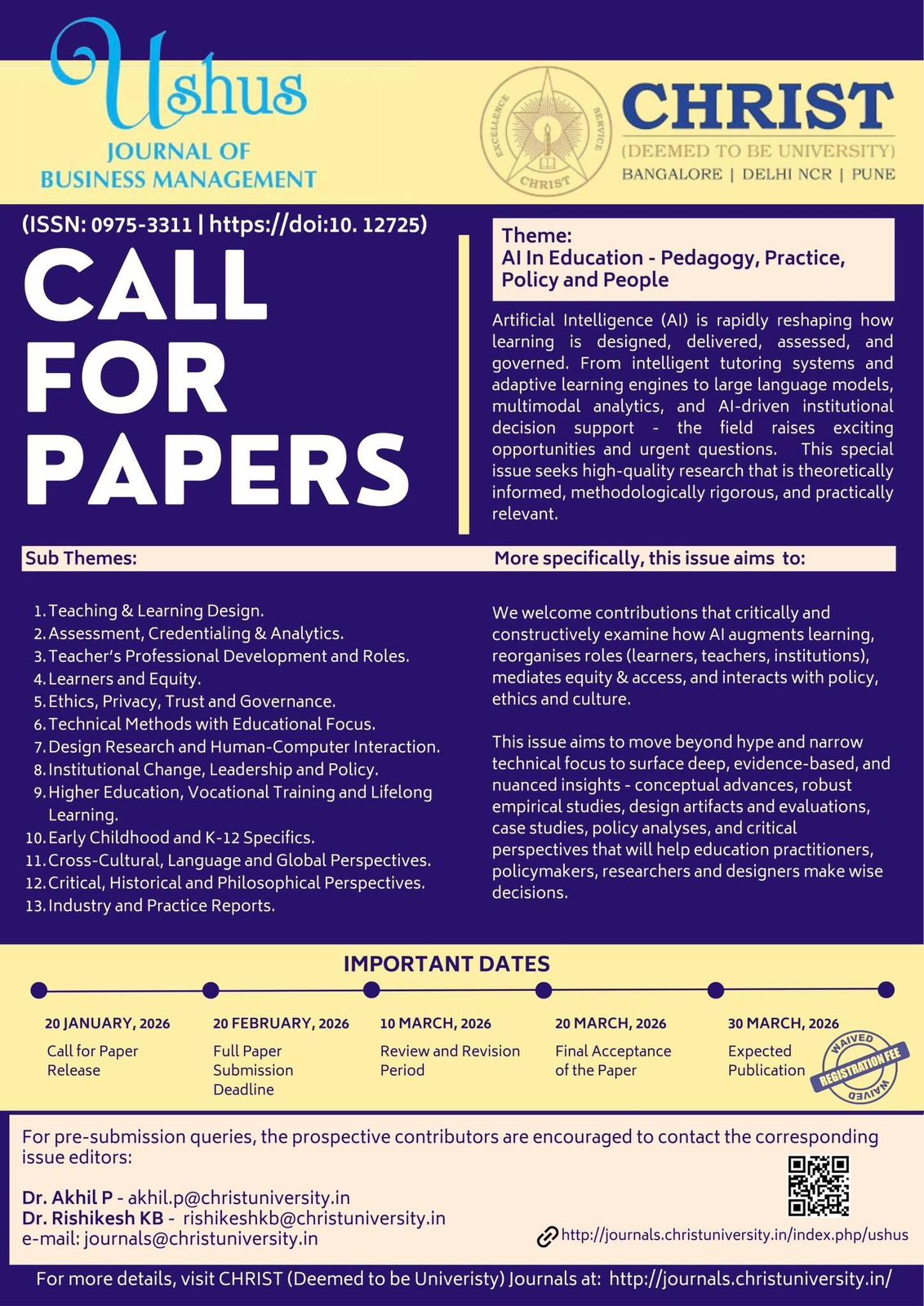Organizational Citizenship Behaviours - Antecedents, Outcomes & Paradoxes: A Literature Review
DOI:
https://doi.org/10.12725/ujbm.53.3Keywords:
Organizational citizenship behaviours, compulsory citizenship behaviours, organizational effectivenessAbstract
Organizational Citizenship Behaviours(OCBs) have a
significant impact on how employees go over and beyond
at the workplace and form a competitive edge for their
firms. Grounded in industrial-organizational psychology,
OCBs provide insights for leaders and managers to align
and engage staff to improve organizational effectiveness.
While a lot of studies have focused on the benefits of
citizenship behaviours, there are paradoxes which need
more attention. This paper reviews the literature on
OCBs, the antecedents, outcomes and paradoxes when
excessive OCBs can come in the way of organizational
success.
References
Ackfeldt, A. L., & Coote, L. V. (2005). A study of organizational
citizenship behaviors in a retail setting. Journal of Business
Research, 58(2), 151-159.
Bakker, A. B., & Schaufeli, W. B. (2008). Positive Organizational Behavior:
Engaged Employees in Flourishing Organizations. Journal of
Organizational Behavior: The International Journal of Industrial,
Occupational and Organizational Psychology and Behavior, 29(2), 147-154.
Bateman, T. S., & Organ, D. W. (1983). Job satisfaction and the good
soldier: The relationship between affect and employee “citizenship”.
Academy of Management Journal, 26(4), 587-595.
Bergeron, D. M. (2007). The Potential Paradox of Organizational
Citizenship Behavior: Good citizens at what cost? Academy of
Management Review, 32(4), 1078-1095.
Bolino, M. C., & Turnley, W. H. (2003). Going the extra mile: Cultivating
and managing employee citizenship behavior. Academy of Management
Perspectives, 17(3), 60-71.
Bolino, M. C., Turnley, W. H., Gilstrap, J. B., & Suazo, M. M. (2010).
Citizenship under pressure: What’s a “good soldier” to do?. Journal of
Organizational Behavior, 31(6), 835-855.
Bolino, M. C., Hsiung, H. H., Harvey, J., & LePine, J. A. (2015). “Well, I’m
tired of tryin’!” Organizational citizenship behavior and citizenship
fatigue. Journal of Applied Psychology, 100(1), 56.
Chan, S. H. J., & Lai, H. Y. I. (2017). Understanding the link between
communication satisfaction, perceived justice and organizational
citizenship behavior. Journal of Business Research, 70, 214-223.
Christ, O., Van Dick, R., Wagner, U., & Stellmacher, J. (2003). When
teachers go the extra mile: Foci of organizational identification as
determinants of different forms of organizational citizenship
behaviour among schoolteachers. British Journal of Educational
Psychology, 73(3), 329-341.
Drucker, P. F. (1999). Knowledge-worker productivity: The biggest
challenge. California Management Review, 41(2), 79-94.
George, J. M., & Brief, A. P. (1992). Feeling good-doing good: a conceptual
analysis of the mood at work-organizational spontaneity
relationship. Psychological Bulletin, 112(2), 310.
Kandlousi, N. S. A. E., Ali, A. J., & Abdollahi, A. (2010). Organizational
citizenship behavior in concern of communication satisfaction: The
role of the formal and informal communication. International Journal of
Business and Management, 5(10), 51.
Katz, D. &Kahn, R. L (1978). The Social Psychology of Organizations,2. New
York: Wiley.
LePine, J. A., Erez, A., & Johnson, D. E. (2002). The nature and
dimensionality of organizational citizenship behavior: a critical
review and meta-analysis. . Journal of Applied Psychology, 87(1), 52.
Mazzei, A. (2014). Internal communication for employee enablement:
Strategies in American and Italian companies. Corporate
Communications: An International Journal, 19(1), 82-95.
Organ, D. W. (1997). Organizational citizenship behavior: It’s construct
clean-up time. Human Performance, 10(2), 85-97.
Podsakoff, N. P., Whiting, S. W., Podsakoff, P. M., & Blume, B. D. (2009).
Individual-and organizational-level consequences of organizational
citizenship behaviors: A meta-analysis. Journal of Applied Psychology,
(1), 122.
Rioux, S. M., & Penner, L. A. (2001). The Causes of Organizational
Citizenship Behavior: a Motivational Analysis. Journal of Applied
Psychology, 86(6), 1306.
Smith, C. A., Organ, D. W., & Near, J. P. (1983). Organizational
Citizenship Behavior: Its Nature and Antecedents. Journal of Applied
Psychology, 68(4), 653.
Van Dick, R., Grojean, M. W., Christ, O., & Wieseke, J. (2006). Identity and
the extra mile: Relationships between organizational identification
and organizational citizenship behaviour. British Journal of
Management, 17(4), 283-301.
Van Dyne, L., & Ang, S. (1998). Organizational citizenship behavior of
contingent workers in Singapore. Academy of Management Journal,
(6), 692-703.
Vigoda-Gadot, E. (2006). Compulsory Citizenship Behavior: Theorizing
Some Dark Sides of the Good Soldier Syndrome in Organizations.
Journal for the Theory of Social Behaviour, 36(1), 77-93.



